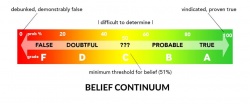Certainty and Belief
It is helpful to click on the image on the right to open it, and then read the article below.


The next time you're in a serious discussion and someone asks how how you know you're right, skip the long winded explanation and simply say that you don't know. Then get out this graph (at least mentally) and ask them to put an "x" where the proposition that you're debating falls on the scale for them. Then put an "x" where it falls for you.
Next, ask them to explain HOW the proposition ended up where it did for them. And then, you do the same. The point is to force people to do a little bit of critical thinking without being a jerk.
We call this a "Belief Scale", "Belief Continuum" or "Certainty Spectrum". We all have one whether we realize it or not.
Here are a few points of interest:
- God doesn't have beliefs, only knowledge. He doesn’t need beliefs because–unlike you and I–he DOES know. He is omniscient (complete information) and is the 'logos' (perfect reasoning). Therefore, to God the truthfulness of all propositions is binary: either true–or false.
- We have incomplete information and imperfect reasoning. And yet we often treat our conclusions as if they are as binary as God's omniscient knowledge, either absolutely true or obviously false.
- Although we really don't think about these things in mathematical terms, anything falling from (51% - 100%) on your scale is a BELIEF that you currently hold (more likely true than not). Anything left of that is not a belief that you hold.
- If every truth proposition that you've ever been faced with were represented by a dot on this scale, what would it look like? My hypothesis is that people who do good research and apply solid reasoning would have a greater dispersion of dots across the entire range while poor thinkers would tend to have more polarity (dots concentrated at the ends of the scale). In addition, I believe that humble, careful thinkers will tend to have more displacement in their graphs, that is, over time their beliefs (dots) would have shifted positions up or down the graph compared to people who are not.[1]
Grace vs. Doubt
Dietrich Bonhoeffer wrote:
- In one way or another every Christian fights unbelieving doubt. It is in our nature in this fallen world. It is a great part of the “not yet” of life. The question, though, is whether the defining characteristic of our lives is unbelieving doubt or God’s grace.
- A Christian who is defined by unbelieving doubt, whether intellectual or marked by lifestyle, is in a precarious position. The Bible, God’s holy Word, describes how a tree is known by its fruit. If the fruit of our lives is that of questioning God at every turn with our mouths or our choices, what does that say of our roots? Are they in God? Are we tapped into His great source of grace and peace and belief?
- I leave the question hanging because I cannot answer it for you. Christians, saved by grace, go through terrible times of rebellion, apathy, and other sorts of spiritual malaise. Some people oversimplify this and gauge others’ salvation entirely by what can be seen in their actions or lifestyles. That simply doesn’t work. Some people look like saints and have hearts full of hell (what Jesus called “whitewashed tombs”[2]). Others live like hell but are fighting internal battles back toward Jesus. Only God and the individual know where the person really is on the belief-unbelief continuum. Only God can rightly determine who is saved or unsaved. This is one of the greatest mysteries of the Christian life. God has not given us this to know.
- Fruit is always the miraculous, the created; it is never the result of willing, but always a growth. The fruit of the Spirit is a gift of God, and only he can produce it. They who bear it know as little about it as the tree knows of its fruit. They know only the power of him on whom their life depends.[3]
Footnotes